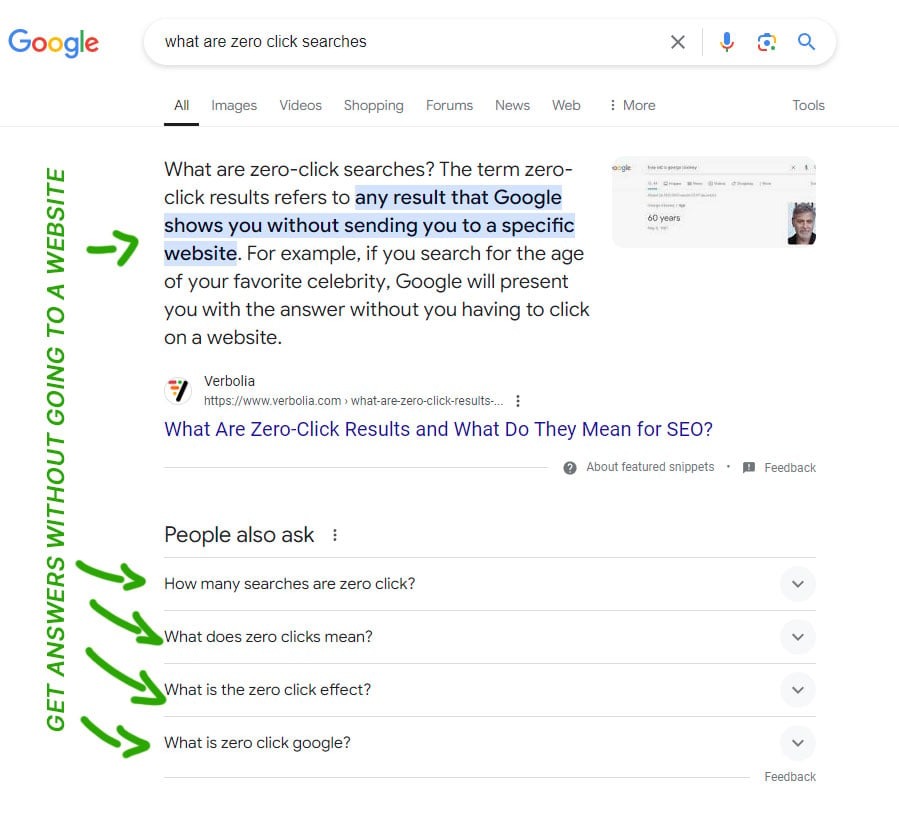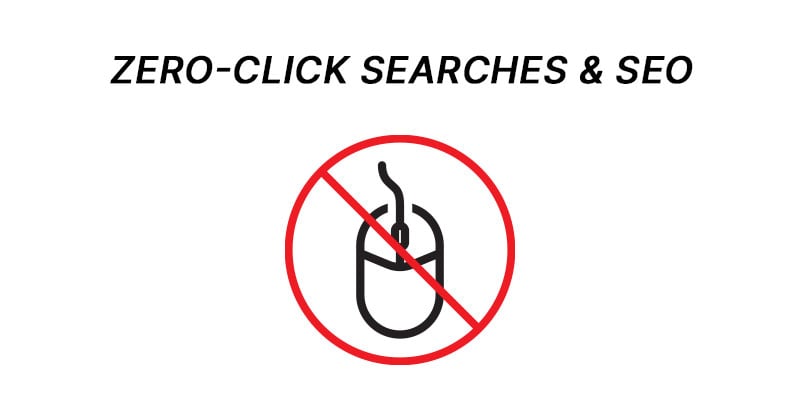When Google refines its searches, they don’t always prioritize your business. Like many other companies, they refine their products and services based on what users want, not necessarily your accountant and bottom line. You might have noticed that Google searches have changed in the last couple of months. In May, Google introduced AI summaries to their searches, helping billions of users get the answers to their queries even faster. For businesses who count on appearing at the top of those search results though, these zero-click searches could be perceived as a big problem. Don’t worry just yet, the SEO strategies you spent months implementing aren’t suddenly useless. Zero-click searches are already having an impact on websites and SEO, but not all of it is a bad thing.
Even before Google added AI summaries to searches, not every search resulted in a ‘click’. According to the latest data, over 60% of Google searches do not result in an eventual click. For a significant amount of searches, that just makes sense. Not everyone is searching for a product, service, or business - some people just want an answer to a basic question. For years, copywriters, article writers, and bloggers alike wrote similar content. It’s time for website owners and content creators to shift how they try to address user questions, and queries, through their web pages.
For our clients, it’s still important to provide valuable info. If it’s a blog post, we make sure to answer the question very clearly so Google knows what text to take and show in their summaries. We also add things like key takeaways and tables of contents, which Google likes for these things. There’s still a priority on showing authority. These types of searches rarely impact our clients because people still need to click to buy a product or contact us/you. However, if you run an info-only website relying on affiliate dollars or ads, you might need to rethink your strategy.
The future of SEO will continue to evolve with these updates. While zero-click searches may seem daunting, focusing on providing clear, authoritative information will always be key. The AI summaries will likely get better, but for now, businesses providing services and products still have an edge.
What Are Zero-Click Searches?

A zero-click search is any that results in a user getting their information without having to click onto another page.
A lot of website content is already designed this way. Many copywriters and bloggers will create various snippets and answers in their content so that that brief explanation appears on the results page. It’s extremely beneficial to the user, but when you have a site or service that also addresses that question, you could see a loss in traffic.
The Rise of Zero-Click Searches
This previously-linked study sheds a lot of light on the rise of zero-click searches. While the exact percentage varies between the US and Europe, data suggests that most Google searches end without a click. First of all, that’s a testament to just how optimized Google’s search results have gotten. Not only that, a much more surprising statistic shows that almost 30% of the clicks that do occur lead to other Google properties like YouTube, Google Images, Maps, and others.
So did Google arrange some monopoly on their search results? No, but they do very much know what they’re doing. With the improvements they’ve made to their own algorithms, the search engine is no longer relying on user’s clicking through to the results it generates. Its crawlers can now comprehend more content, which further refines searches and has been forcing website owners to get more creative with their SEO. Voice search has also become increasingly popular with 63% of users in the United States using it. Those results are typically read aloud by Google, not viewed or clicked on a phone screen, which also contributes to zero-click results.
Zero-click searches are on the rise, that’s undeniable, but website sales and traffic haven’t tanked…yet.
Impact on Website Traffic
There aren’t many concrete statistics available on this, but zero-click searches will have an impact on traffic and website CTR. Organic traffic is obviously going to be impacted when users can get their answers directly from the search instead of from the pages on your website. When a user is looking for a quick answer, why would they spend time clicking on more sites when Google answers for them?
For businesses that don’t adapt, this is going to be a big and growing problem. Users are lazy. They want their answers and their products right now. If Google is willing to provide that, then those who don’t adapt will be left by the wayside watching their click-through rates going down the toilet. You don’t have to be those businesses, though.
Some industries are going to be affected more than others, which can alleviate your worries or increase them. There are many affiliate websites around these days. They can be promoting products, rating products, or pushing different services for a nominal fee. You probably think you’re too smart to fall for affiliate content, but you’ve undoubtedly experienced advertising that you didn’t realize was advertising. Those affiliate links and websites are going to see the biggest impact.
If the search results answer the question, or if a snippet on their page addresses a user’s concern, why would they need to click through to the next page? They got what they came for. That doesn’t mean your business has suddenly lost all of its organic traffic, it just means you should employ some of the following strategies.
Adapting SEO Strategies for Zero-Click Searches
Zero-click searches aren't the end of the road for your SEO efforts. They just mean you need to tweak your approach so users can still find your business organically. Here are a few strategies to keep your business visible:
Answer Questions Clearly
Make sure each page on your website answers its main question or fulfills its purpose as clearly as possible. This helps Google understand what to feature in their AI summaries and snippets. Direct and concise answers are key.
Use Key Takeaways and Table of Contents
Including key takeaways and a table of contents in your content helps Google and users quickly find relevant information. These elements make your content more accessible and increase the chances of it being featured in search results.
Show Authority
Establishing authority is crucial. Include authoritative links, cite reliable sources, and showcase your expertise. Google's AI prefers content that demonstrates credibility and expertise.
Optimize for Featured Snippets
Craft your content to match the format of featured snippets. Use headers, bullet points, and concise paragraphs. Study existing snippets to understand how to structure your content effectively.
Regularly Update Content
Keep your content fresh and up-to-date. Regular updates signal to Google that your content is current and relevant, which can help maintain or improve your search rankings.
Leverage Long-Tail Keywords
Focus on long-tail keywords that are specific to your niche. These keywords often have less competition and are more likely to capture targeted traffic. They also help in addressing specific queries more effectively.
Benefits of Zero-Click Searches
No matter what you sell or offer, you likely consider yourself and your business to be ‘experts’ on the subject. You spent years honing your craft and your customers have noticed, but how are you going to get traffic to notice when they don’t click on your website? You offer that genuinely helpful content I was talking about.
If you want to appear on Google’s results, predict user behavior and create content that addresses it. If your product solves a problem, write helpful blog content that describes that problem as well as how it’s solved. That way you inform your user of the problem as well as your solution to it. By establishing your business as an authority you’ll not only improve your brand’s visibility in those search results, you’ll actually improve the brand overall. Users will know they can come to your website to learn and not just be sold to, and that’s value and trust you cannot buy.
Once you’ve created a name for yourself, you organically build trust with the community you’re trying to convert into customers. It might be a more time-consuming process than the SEO-enriched days of old, but you’ll create a brand voice users want to hear.
Future of Zero-Click Searches
Businesses will take any advantage they can get and that is never going to change. If something can be exploited, it’s likely going to happen. Fortunately though, taking advantage of zero-click search results is going to benefit all of us. They can very much affect future trends and SEO, but likely in the best possible ways. It will force businesses to create concise and descriptive content that tells you exactly what you need to know. If they want to compete with AI summaries, they’re going to need to make worthwhile content with targeted keywords, not overstuffed and overoptimized clickbait.
If you’re wondering how your business can adapt to these changes, start implementing the above strategies and measure the changes. Answer direct questions, write helpful guides and content, and keep answers short and concise so Google’s crawlers are more likely to pull and use the text.
Once you establish your business as one that provides as much useful information as it does products or services, you’ll remove Google as the middleman and get that traffic you’ve been looking for.




